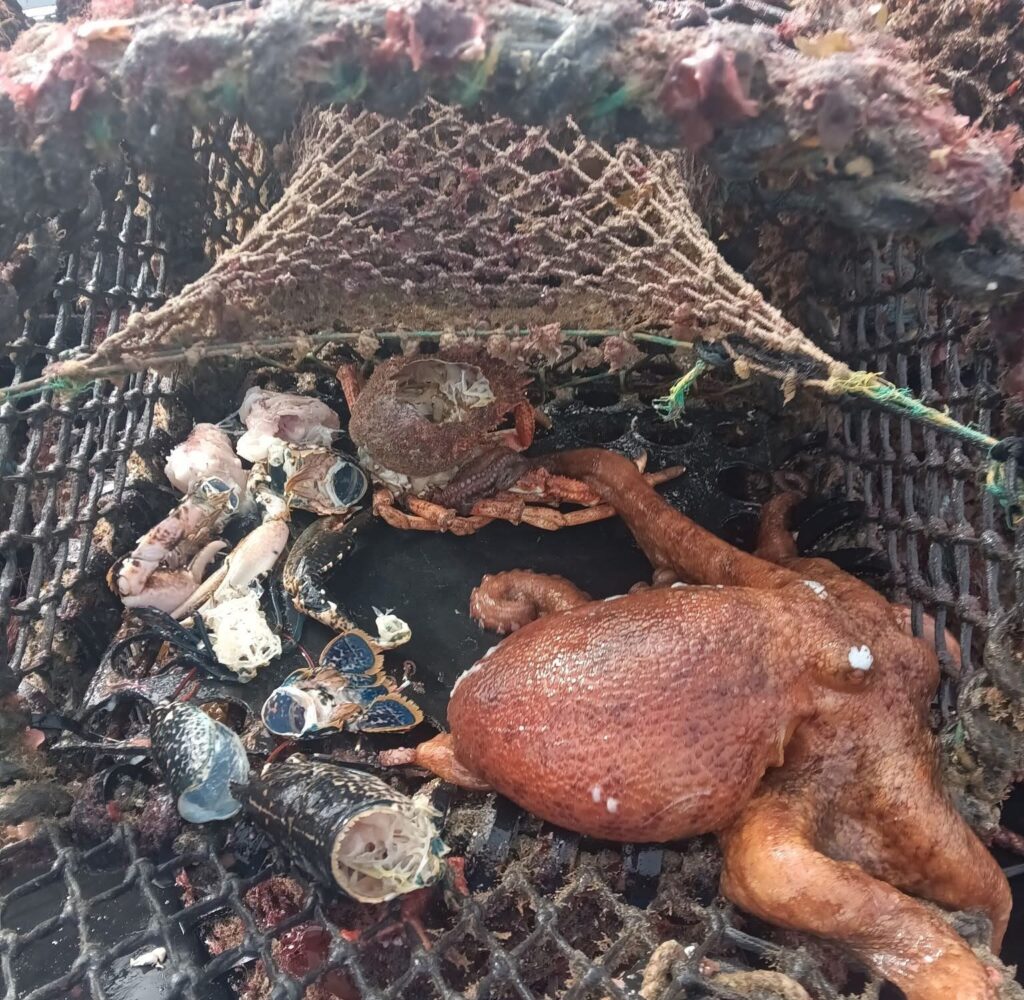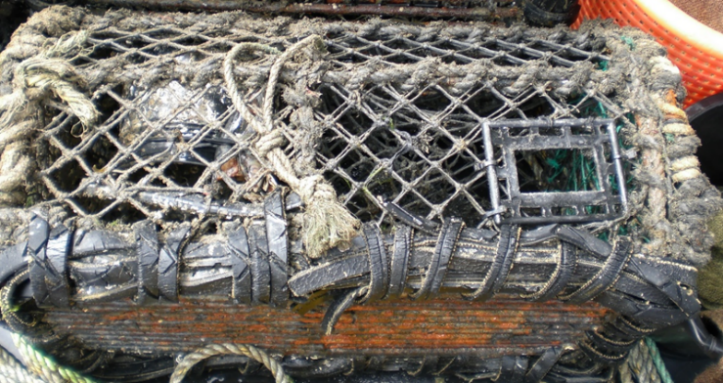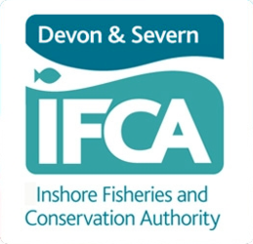D&S IFCA provides clarity on the applicability of Potting Permit Conditions with a view to addressing issues relating to predation by octopus and concerns raised by the fishing industry about the use of escape gaps in pots.
D&S IFCA is aware of current significant difficulties being experienced by the fishing industry within its District in respect of predation by octopus within shellfish pots.

Fishers report that octopus are entering the pots, predating on crab and lobster, and then exiting the pots leaving no catches, including octopus, for the fishers to retain. Fishers are reporting that the entry and exit to pots may be through escape gaps fitted in pots. D&S IFCA is aware that this is having an impact on fishers’ catches of shellfish and their livelihoods.
Escape Gaps
Escape gaps enable undersized shellfish to escape a pot, and the requirement for their fitting was originally driven by requests from members of the fishing industry. The initiative was as a conservation measure to allow juvenile crab and lobster to escape the pots and avoid predation from larger crab and lobster. Some fishers have the view that the benefits of escape gaps also include saving them time sorting through their catch and limiting impacts of ghost fishing/pots not hauled for extended periods.

The requirement for the fitting of escape gaps is one of the conditions in the D&S IFCA Potting Permit Conditions, with the legislation originally introduced many years ago in Devon Sea Fisheries Byelaws.
The requirements to fit escape gaps relate to the design of the pots and the time of year that the pots are used.
Pots in use from 1st April to 31st December (inclusive) may require the fitting of escape gaps, depending on their design. Escape gaps must be fitted if the construction of the entrance to the pot or an additional chamber (parlour), or chambers within the pot is made from netting. This therefore applies to parlour pots and creels but not to inkwell pots.
Recognising there is an emerging fishery for octopus within the D&S IFCA’s District, D&S IFCA has listened to the concerns raised and reviewed the evidence provided by the fishing industry. D&S IFCA has examined the Potting Permit Conditions in regard to their applicability to this emerging fishery and sought legal advice.
Short Term Action – Clarity on the Applicability of Potting Permit Conditions:
- The requirement to have escape gaps in the pots, which have an entrance or entrances to the pot or internal chamber of the pots constructed from netting, relates to ‘fishing for crab, lobster or spiny lobster’. It does not apply if these types of pots are being used to fish for octopus only.
- Where fishers that are targeting octopus with pots, rather than crab, lobster or spiny lobster, none of those pots require escape gaps to be fitted. Consequently, a fisher can choose to remove or close as many escape gaps in pots as they wish, if they target octopus.
- If hauling pots with escape gaps closed or removed, the fisher can retain any octopus, but the fisher must return any crab, lobster and spiny lobster caught, as these are no longer the target species for those pots.
- Fishers who wish to target crab, lobster or spiny lobster must continue to use escape gaps in any pot with an entrance constructed from netting to the pot or internal chamber.
- Fishers may target different species and retain a combination of crab, lobster, spiny lobster and octopus on a fishing trip.
- Alternatively, fishers can choose to remove all the entrances constructed from netting and replace the entrances with a funnel or alternative (hard eye) entrance.
Further Actions – What Can be Done?
D&S IFCA is in the process of gathering information and evidence. The fishing industry is assisting D&S IFCA with some research work. Information and evidence will be presented to D&S IFCA’s Byelaw and Permitting Sub-Committee (B&PSC) on 26th June 2025, when the issues relating to the octopus fishery will be considered in more depth.
The B&PSC includes representatives of the fishing Industry, those with other interests, and Members representing the Marine Management Organisation, the Environment Agency, and Natural England. Funding Local Authority Members are invited to attend the B&PSC meetings too. A list of IFCA Members can be viewed on the website.
Decision making by D&S IFCA is evidence led. It is possible that B&PSC Members may wish to engage further with the fishing industry to understand how fishers would like D&S IFCA to manage the octopus fishery in the long term. Findings of any consultation will be submitted to the B&PSC for discussion, and appropriate changes to the Potting Permit Conditions will be considered.
Process and Time
There is no statutory power in the Marine & Coastal Access Act 2009, which governs the use of byelaws by IFCAs, to suspend legislative provisions. Therefore D&S IFCA has no power to suspend the requirement for escape gaps, so if necessary, it is the Potting Permit Conditions that will be amended, rather than the Potting Permit Byelaw.
Some fishers may be frustrated that the formal process (as set out in the Potting Permit Byelaw) to potentially amend permit conditions may appear to take too long. D&S IFCA can assure all stakeholders that changes to permit conditions can be made much more quickly than creating or amending a byelaw. D&S IFCA appreciates that the concerns of the industry are very real, time sensitive and a source of considerable anxiety, but D&S IFCA can only act within the law and must follow stipulated statutory procedures.
Communication
D&S IFCA is open to discussing issues experienced by fishers. D&S IFCA has very limited resources and due to this Officers cannot undertake regular port to port visits with fishers. However, Officers do talk to fishers and their representatives and attend relevant organised meetings with the fishing industry and other stakeholders.
Officers can be contacted by telephone and email, and online meetings are possible to arrange. The permit-based model allows for direct communication with permit holders. D&S IFCA also welcomes approaches by journalists to gain up to date accurate information for further reporting or to further circulate D&S IFCA produced news items.
Keeping you informed
All papers and reports presented to the Full Authority and the B&PSC are published on D&S IFCA’s website. The Authority & B&PSC Meetings page is regularly updated with downloadable information. The minutes from all Full Authority and B&PSC meetings are published on the website.
We regularly post information about our work on our website/Facebook. Direct communication is often the best way to help you stay informed about our work and to highlight the opportunities for you to have your say on a range of topics or issues. If you are not already on our mailing list, then you can get yourself added by contacting D&S IFCA.
